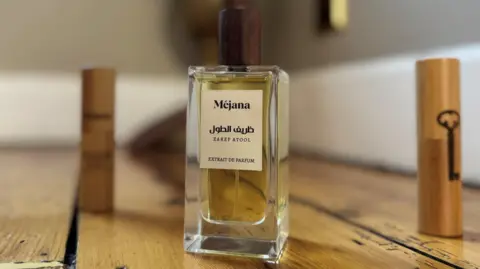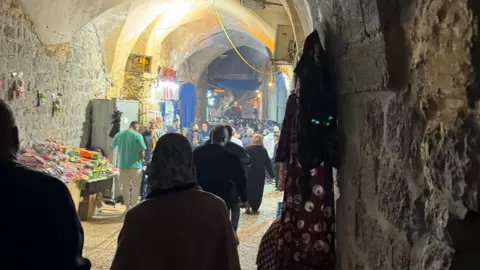Capturing the aroma of Palestinian life in a bottle

 Sebastian Usher
Sebastian UsherA young Palestinian couple in Jerusalem have produced a range of perfumes that embody the heritage of their people. Despite the horrors of the war in Gaza, they hope their perfumes can still evoke memories of a better time, as Sebastian Usher reports from Jerusalem.
Out in the fields of the Jordan Valley, Palestinian women still sing old folk songs as they harvest olives. Another tells the story of a legendary ship carrying a life-saving cargo of food heads to port during a terrible famine that swept the Levant in the dying days of Ottoman rule. While in the Old City of Jerusalem, the scents of leather, spices and livestock combine to create a scent that evokes thousands of years of history.
“We are trying to send a message to people with our perfumes, expressing our origins and the scent of our country,” said Qassem Abu Khalaf as he explained the motivation behind the Mejana fragrance line he launched with his wife, Malak Hijazi. .
The young couple are Palestinians from the Beit Hanina neighborhood in East Jerusalem. He is an advanced materials engineer and an English and special needs teacher. Their fragrance line grew out of Qassem’s passion developed over the years for producing high quality perfumes. He worked at night on his ideas, building a library of hundreds of ingredients.
In a restaurant in East Jerusalem amid the ongoing war in Gaza, he says that the five perfumes he has produced are intended for people to hold a piece of Palestinian history in their hands. While for the Palestinians themselves, he hopes it’s a way to reconnect with their roots in the Proustian rush of smell-induced memory.
He and Malak chose the name Mejana, as it is a name that describes the old songs that Palestinians sing as they work.
“Mejana has a special rhythm when you sing it,” said Malak. “It means happiness and joy. We chose this one, because when you smell good, you feel good, you feel happy in the same way.”
 Sebastian Usher
Sebastian UsherThe memory of the Palestinian people also influenced the creation of their first two fragrances. Zaref Atool is a dark, heavy scent – very much what people expect from an oriental style. Qassem says it aims to recreate the feel of the ancient, labyrinthine streets of Jerusalem’s Old City. It is named after the main character in a famous old song – in which the singer laments that a tall, handsome young man is leaving his homeland of Palestine to go far away.
Another scent is called Rozana, after the ship that was long awaited by starving people across Palestine, Lebanon and Syria after the wheat harvest failed a century ago. It was meant to bring salvation, but it only brought disappointment and bitter loss – as its burdens cost nothing. Also, there is a famous song inspired by the story sung by many Arab singers, such as Fairouz and Sabah.
“I love our identity, our origin, our history and I am proud of it,” said Malak.
If the past is their inspiration, then the present has complicated their efforts to create and present a brand that celebrates Palestinian identity.
“We launched our brand on September 27 last year,” said Malak. “We went to two markets in Jerusalem but the war started and stopped everything for many months.”
Sock shops in the Old City and elsewhere in Israel and the heavily populated West Bank are empty of visitors, as shopkeepers struggle to survive in the bustling local market.
 Sebastian Usher
Sebastian UsherQassem and Malak have had success selling their perfumes to the Palestinian diaspora – in Australia in particular. And they have continued undeterred, producing a second range of three fragrances, beautifully presented in a box painted by a Palestinian artist with local flowers and wild animals.
The perfumes themselves are contained in wooden capsules with a key engraved on one side, which opens a golden dispenser when turned. The big old key is a symbol of all the Palestinian homes that were lost when hundreds of thousands were expelled or fled during the 1948 war that established the State of Israel.
“When we chose the key, it was about our memories,” Malak said. “It’s designed a little differently than the traditional Palestinian key, but it’s related to it. When you smell a certain smell, it brings back good memories. So, it’s the key to our ancestors and our childhood memories.”
The couple not only produced their new range of perfumes – with combinations such as tuberose and berry, and coconut and agarwood – but also their first child – a daughter, Sadeel.
Qassem and Malak say that it is a difficult time to bring new life to a country with such conflict. Malak says she feels guilty about it but had to stop watching news about Gaza during her pregnancy as it was causing her so much stress – and she was afraid it might affect her baby.
“It’s not easy,” said Qassem. “But we hope that everything will end and we will have peace. Peace of mind, too.”
Source link




